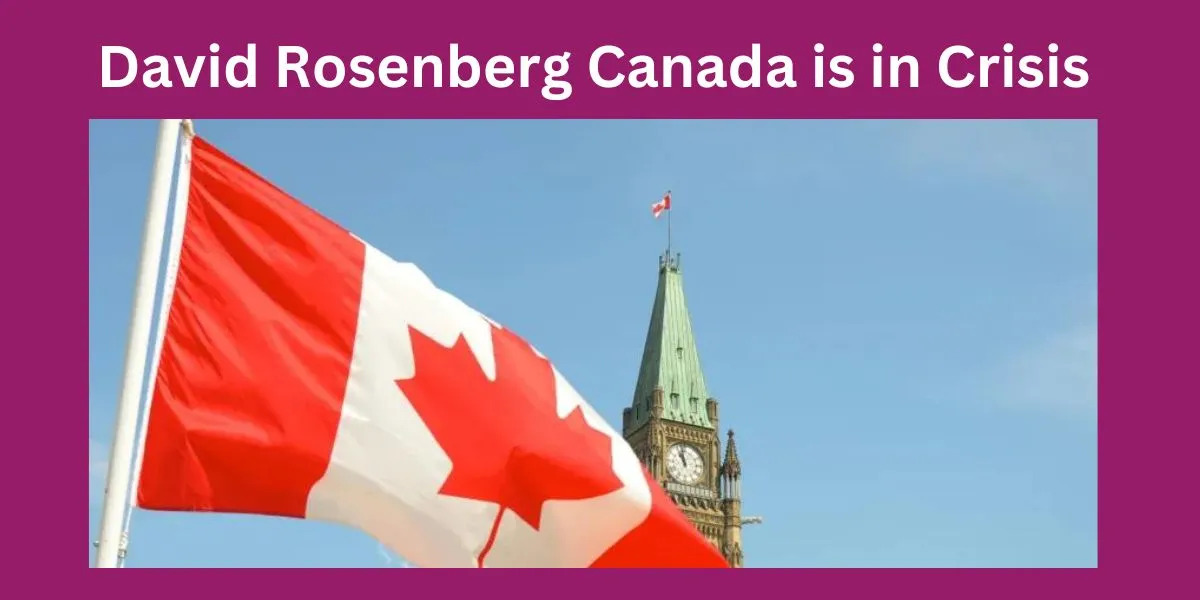Canada, a land of vast beauty and resources, has found itself in a precarious situation. Over the past few years, the country has faced economic uncertainties, rising inflation, and various social challenges. But as David Rosenberg, the renowned economist, points out, while things may seem grim right now, there could be hope on the horizon. In this article, we’ll delve deep into Rosenberg’s views on Canada’s current crisis and explore the potential silver linings that could change the narrative sooner than expected.
The Current Economic Situation in Canada
Rising Inflation and Its Effects
Inflation has been a major concern for Canadians in recent years. From groceries to housing, the cost of living has surged, making it harder for everyday citizens to make ends meet. So, what’s causing this? Supply chain disruptions, increased demand, and the global economic ripple effects of the pandemic have all played a part.
But as much as it feels like there’s no end in sight, David Rosenberg suggests that we may have reached the peak. Could we be on the verge of a slowdown? Many hope so.
Interest Rates and Their Impact
In response to inflation, the Bank of Canada has aggressively raised interest rates, aiming to cool down the economy. While this helps to some extent, it also brings its own set of challenges. Higher interest rates mean higher mortgage payments, which isn’t exactly what Canadians, already struggling with skyrocketing housing prices, want to hear.
Rosenberg, however, argues that this rate hike might not be permanent. If inflation shows signs of steadying or even declining, we could see interest rates come back down, easing the burden on homeowners and potential buyers alike.
The Housing Market: A Crisis of Its Own
Housing Affordability at an All-Time Low
It’s no secret that Canada’s housing market has been one of the hottest topics for years now. With prices soaring to unimaginable levels, many Canadians feel like owning a home is just a pipe dream. The average home price in major cities like Toronto and Vancouver is beyond the reach of most first-time buyers. And even those who already own homes are feeling the pinch with increasing property taxes and interest rates.
What’s Driving the Crisis?
A combination of factors has led to this housing crisis. Low supply, high demand, and years of low interest rates created a perfect storm. Foreign investors, urbanization, and even government policies have all contributed to pushing prices higher and higher.
David Rosenberg suggests that the housing market might cool off soon as higher interest rates dampen demand. But will it be enough to solve the affordability problem? Time will tell.
Employment Woes and the Job Market
High Unemployment Rates Amid Economic Growth
While certain sectors of the economy have bounced back after the pandemic, others are still struggling. Many Canadians are finding it hard to secure stable, well-paying jobs. The tech sector has seen layoffs, and traditional industries like manufacturing have been slow to recover.
The Gig Economy: A Blessing or a Curse?
Many Canadians have turned to the gig economy for supplemental income, but this isn’t always a sustainable solution. While it provides flexibility, gig work lacks the benefits and security that come with full-time employment. Rosenberg highlights the need for better labor policies to protect these workers while also addressing the growing skills gap in the job market.
Government Debt: A Looming Concern
Canada’s National Debt: Are We in Trouble?
Canada, like many countries, took on significant debt to manage the economic fallout from the pandemic. While necessary at the time, this debt now weighs heavily on the government. Rosenberg has expressed concerns about how sustainable this level of debt is, especially if interest rates remain high.
Could austerity measures be on the horizon? That’s a possibility, but Rosenberg suggests that targeted investments in infrastructure and education could help grow the economy, making the debt more manageable in the long run.
The Environmental Crisis and Its Economic Impact
Climate Change: A Growing Threat to the Economy
Canada’s environment is another area of concern. From forest fires to extreme weather, the effects of climate change are becoming more apparent each year. And these environmental issues aren’t just ecological—they’re economic too.
The cost of dealing with climate-related disasters is rising, and businesses are feeling the impact. Whether it’s the agricultural sector struggling with droughts or the tourism industry facing unpredictable weather, no part of the economy is immune.
The Push for Green Energy
On a positive note, Canada has the potential to be a leader in green energy. Investing in renewable resources like hydroelectricity and wind power could not only help the environment but also provide a significant economic boost. Rosenberg is optimistic that green energy could play a major role in Canada’s economic recovery, positioning the country as a global leader in sustainability.
Is There Hope for the Future?
Signs of Stabilization on the Horizon
Despite all the doom and gloom, there are signs that things may be turning around. Rosenberg points to a number of indicators that suggest the economy could stabilize in the coming months. If inflation begins to taper off and interest rates follow suit, Canada’s economic outlook could improve sooner than expected.
A Return to Normalcy?
Rosenberg’s predictions hinge on the assumption that global conditions will stabilize. If the pandemic’s aftershocks continue to fade and geopolitical tensions ease, Canada could find itself on a path to recovery. But there are no guarantees. The global economy is interconnected, and external factors could still throw a wrench into the works.
The Role of Government in the Recovery
What Can the Government Do?
The government has a crucial role to play in steering Canada out of this crisis. Rosenberg stresses the importance of smart fiscal policies that focus on long-term growth rather than short-term fixes. Infrastructure projects, investment in education, and support for innovation could all help stimulate the economy.
Avoiding Common Pitfalls
One thing Rosenberg warns against is relying too heavily on Band-Aid solutions like stimulus checks. While helpful in the short term, these measures don’t address the underlying issues facing the economy. A more sustainable approach is needed, one that tackles the root causes of the crisis.
David Rosenberg’s Optimism: A Glimmer of Hope?
Why Rosenberg Believes in a Brighter Future
So, why is David Rosenberg, an economist known for his often cautious outlook, feeling optimistic about Canada’s future? It’s simple: he believes the worst is behind us. While we’re still feeling the effects of the pandemic and inflation, he sees signs that the economy is adjusting. The housing market is showing signs of cooling, interest rates may soon peak, and employment is gradually improving.
Can Canada Bounce Back?
Canada has weathered many storms in its history, and Rosenberg is confident that this crisis will be no different. While challenges remain, there’s reason to believe that Canada’s resilience and resourcefulness will see it through.
Conclusion: A Crisis, but Not for Much Longer
Canada is undoubtedly facing a challenging period. From rising inflation to a housing crisis and environmental concerns, there’s a lot to worry about. But as David Rosenberg points out, every crisis comes with opportunities. With the right policies and a bit of patience, Canada could find itself on the road to recovery sooner than many expect.
FAQs
1. What is David Rosenberg’s main message about Canada’s economic crisis?
David Rosenberg believes that while Canada is currently facing significant challenges, there are signs that the worst may be over, and the economy could begin to stabilize soon.
2. Why is housing affordability such a big issue in Canada right now?
Housing prices have skyrocketed due to a combination of low supply, high demand, foreign investment, and years of low interest rates, making homeownership out of reach for many Canadians.
3. How does inflation affect Canadians?
Inflation drives up the cost of goods and services, making everyday living more expensive. This affects everything from groceries to housing and puts a strain on household budgets.
4. What role does the government play in Canada’s economic recovery?
The government has a key role in shaping the recovery through smart fiscal policies, investments in infrastructure and education, and avoiding short-term solutions that don’t address the underlying issues.
5. Is there hope for Canada’s economy to improve in the near future?
Yes, according to David Rosenberg, there are several indicators suggesting that the economy could begin to stabilize, particularly if inflation and interest rates peak and start to decline.










